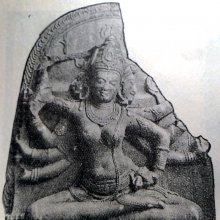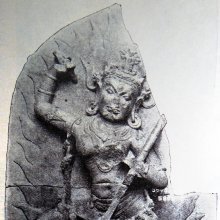Parishad, Pariṣad, Pariṣat, Parishat, Pariśaṭ: 17 definitions
Introduction:
Parishad means something in Buddhism, Pali, Hinduism, Sanskrit, Jainism, Prakrit, the history of ancient India, Hindi. If you want to know the exact meaning, history, etymology or English translation of this term then check out the descriptions on this page. Add your comment or reference to a book if you want to contribute to this summary article.
The Sanskrit terms Pariṣad and Pariṣat and Pariśaṭ can be transliterated into English as Parisad or Parishad or Parisat or Parishat, using the IAST transliteration scheme (?).
Images (photo gallery)
In Hinduism
Dharmashastra (religious law)
Source: Google Books: Hinduism and Law: An IntroductionPariṣad (परिषद्, “religious court”).—In religious and moral matters—in cases of violation of personal law or religious norms—it was often a kind of religious court (brahmasabhā, pariṣad) of more or less learned Brahmins which administered and decided on penances. A chief judge occasionally called “dharmādhikārin” headed it. The brahmasabhā and also caste councils (jātisabhā) could expel individuals from their caste on grounds of impurity or impose fees and other sanctions.

Dharmashastra (धर्मशास्त्र, dharmaśāstra) contains the instructions (shastra) regarding religious conduct of livelihood (dharma), ceremonies, jurisprudence (study of law) and more. It is categorized as smriti, an important and authoritative selection of books dealing with the Hindu lifestyle.
In Buddhism
Mahayana (major branch of Buddhism)
Source: Wisdom Library: Maha Prajnaparamita SastraPariṣad (परिषद्) refers to an “assembly”, according to Mahāprajñāpāramitāśāstra (chapter 3).—Accordingly, “When the Buddha was in this world, the doctrine did not meet any opposition. After the Buddha had departed, when the doctrine was recited for the first time, it was still as it was in the time when the Buddha was alive.—A hundred years later, king Aśoka brought together a great assembly of five hundred (pañcavarṣa-pariṣad) and the great masters of the Dharma debated. As a result of their differences, two distinct sects (nikāya) subsequently developed, [each] having a name. [...]”.

Mahayana (महायान, mahāyāna) is a major branch of Buddhism focusing on the path of a Bodhisattva (spiritual aspirants/ enlightened beings). Extant literature is vast and primarely composed in the Sanskrit language. There are many sūtras of which some of the earliest are the various Prajñāpāramitā sūtras.
In Jainism
General definition (in Jainism)
Source: ORA: Amanaska (king of all yogas): (Jainism)Pariṣad (परिषद्) refers to an “assembly (of the wise)”, according to the 12th century Yogaśāstra (verse 12.55) by Hemacandra: a Jain treatise dealing with Yoga and the highest reality (tattva).—Accordingly, “[This] Upaniṣad of Yoga, which is a cause of wonder in the mind of the assembly of the wise (viveki-pariṣad), was known from scripture, from the mouth of a good Guru and a little from experience in various places. Because of the profuse requesting of the Caulukya king, Kumārapāla, it was placed in the realm of words by his teacher, the honourable Hemacandra. [...]”.

Jainism is an Indian religion of Dharma whose doctrine revolves around harmlessness (ahimsa) towards every living being. The two major branches (Digambara and Svetambara) of Jainism stimulate self-control (or, shramana, ‘self-reliance’) and spiritual development through a path of peace for the soul to progess to the ultimate goal.
India history and geography
Source: What is India: Inscriptions of the ŚilāhārasPariṣad refers to a “vedic assembly” in use during the rule of the Śilāhāra dynasty (r. 765-1215 A.D.).—The age-old Smṛtis had laid down civil and criminal laws, which it was his duty to administer. In case of doubt he had to consult the pariṣad or Assembly of Vedic Scholars. The existence of such a pariṣad in North Koṅkaṇ is indicated by the Cānje inscription, which record a royal gift to it.
Source: Cologne Digital Sanskrit Dictionaries: Indian Epigraphical GlossaryPariṣad.—(LL), four classes of the Buddhist order. (EI 32), used in the sense of pāriṣada, ‘a councillor’. Cf. Tamil paraḍai, etc. (SII 3), an assembly. (CII 1), cf. Prakrit parisā (EI 8), a council; the council [of ministers]; cf. mantri-pariṣad, ‘council of ministers.’ Note: pariṣad is defined in the “Indian epigraphical glossary” as it can be found on ancient inscriptions commonly written in Sanskrit, Prakrit or Dravidian languages.

The history of India traces the identification of countries, villages, towns and other regions of India, as well as mythology, zoology, royal dynasties, rulers, tribes, local festivities and traditions and regional languages. Ancient India enjoyed religious freedom and encourages the path of Dharma, a concept common to Buddhism, Hinduism, and Jainism.
Languages of India and abroad
Sanskrit dictionary
Source: DDSA: The practical Sanskrit-English dictionaryPariṣad (परिषद्).—f.
1) An assembly, a meeting, council, audience; परिषत् स्याद्दशावरा (pariṣat syāddaśāvarā) Manusmṛti 12.111; अभिरूपभूयिष्ठा परिषदि- यम् (abhirūpabhūyiṣṭhā pariṣadi- yam) Śiśupālavadha 1.
2) A religious assembly or synod; चातुर्वैद्यः प्रकल्पी च अङ्गविद् धर्मपाठकः । त्रयश्चाश्रमिणो वृद्धाः परिषत् स्याद्दशा- वरा (cāturvaidyaḥ prakalpī ca aṅgavid dharmapāṭhakaḥ | trayaścāśramiṇo vṛddhāḥ pariṣat syāddaśā- varā) || Aṅgirasasmṛti.
3) A group, collection, circle; बटुपरिषदं पुण्यश्रीकः श्रियेव सभाजयन् (baṭupariṣadaṃ puṇyaśrīkaḥ śriyeva sabhājayan) Uttararāmacarita 4.19; Rām.2.111.5. Also परिषत्त्वम् (pariṣattvam); सहस्रशः समेतानां परिषत्त्वं न विद्यते (sahasraśaḥ sametānāṃ pariṣattvaṃ na vidyate) Manusmṛti 12.114.
Source: Cologne Digital Sanskrit Dictionaries: Shabda-Sagara Sanskrit-English DictionaryPariṣad (परिषद्).—f. (ṣad or ṣat) An assembly, a meeting, an audience or congregation. E. pari around, sad to go, aff. ādhāre kvip.
Source: Cologne Digital Sanskrit Dictionaries: Benfey Sanskrit-English DictionaryPariṣad (परिषद्).—i. e. pari-sad, f. An assembly, an audience, a congregation, [Mānavadharmaśāstra] 12, 110; [Uttara Rāmacarita, 2. ed. Calc., 1862.] 105, 5.
Source: Cologne Digital Sanskrit Dictionaries: Cappeller Sanskrit-English DictionaryPariṣad (परिषद्).—[adjective] sitting around, besetting; [feminine] assembly, congregation.
--- OR ---
Parisad (परिसद्).—(ṣīdati) sit down about, surround, invest, besiege.
Parisad is a Sanskrit compound consisting of the terms pari and sad (सद्).
Source: Cologne Digital Sanskrit Dictionaries: Monier-Williams Sanskrit-English Dictionary1) Pariṣad (परिषद्):—[=pari-ṣad] a (√sad) [Parasmaipada] -ṣadati, [Ṛg-veda];—-ṣīdati, [Atharva-veda; Mahābhārata] ([Calcutta edition] also -sīdati);
—to sit round, besiege, beset, [Ṛg-veda; Atharva-veda; Kauśika-sūtra];
—to suffer damage, be impaired, [Mahābhārata]
2) [v.s. ...] b mfn. surrounding, besetting, [Ṛg-veda]
3) [v.s. ...] f. an assembly, meeting, group, circle, audience, council, [Śatapatha-brāhmaṇa; Kauśika-sūtra; Manu-smṛti] (ṣat-tva n., [xii, 114]), [Mahābhārata] etc.
4) [v.s. ...] Name of a village in the north [gana] palady-ādi
Source: Cologne Digital Sanskrit Dictionaries: Yates Sanskrit-English DictionaryPariṣad (परिषद्):—[pari-ṣad] (t) 5. f. An assembly.
Source: DDSA: Paia-sadda-mahannavo; a comprehensive Prakrit Hindi dictionary (S)Pariśaṭ (परिशट्) in the Sanskrit language is related to the Prakrit word: Parisaḍa.
Source: DDSA: Paia-sadda-mahannavo; a comprehensive Prakrit Hindi dictionary (S)Pariṣad (परिषद्) in the Sanskrit language is related to the Prakrit word: Parisā.
[Sanskrit to German]
Sanskrit, also spelled संस्कृतम् (saṃskṛtam), is an ancient language of India commonly seen as the grandmother of the Indo-European language family (even English!). Closely allied with Prakrit and Pali, Sanskrit is more exhaustive in both grammar and terms and has the most extensive collection of literature in the world, greatly surpassing its sister-languages Greek and Latin.
Hindi dictionary
Source: DDSA: A practical Hindi-English dictionary1) Pariṣad (परिषद्):—(nf) a council; an association; hence ~[dīya] pertaining to or related with a council/an association.
2) Parishad in Hindi refers in English to:—(nm) a councillor, senator; (a) pertaining to [parishad]..—parishad (पारिषद) is alternatively transliterated as Pāriṣada.
...
Nepali dictionary
Source: unoes: Nepali-English DictionaryPariṣad (परिषद्):—n. assembly; council; senate; committee;
Nepali is the primary language of the Nepalese people counting almost 20 million native speakers. The country of Nepal is situated in the Himalaya mountain range to the north of India.
See also (Relevant definitions)
Partial matches: Shash, Pari, Sat.
Starts with: Parisadana, Parisadana, Parishada, Parishadaka, Parishadpavamana, Parishadvala, Parishadvalaya, Parishadvan, Parishadya.
Ends with (+9): Brahmaparishad, Chatraparishad, Devaparishad, Karyaparishad, Mahaparishad, Mantriparishad, Mokshamahaparishad, Mula-parishad, Pancaparishad, Prajna-parishad, Prajnika-parishad, Prashasakiya-parishad, Rajakiya-parishad, Rajyaparishad, Rashtraparishad, Sabhaparishad, Shiksha-parishad, Sthanika-parishad, Suraksha-parishad, Tirthikaparishad.
Full-text (+25): Parishada, Parishattva, Parshad, Parishadvala, Mantriparishad, Shiksha-parishad, Parisa, Sabhaparishad, Vidagdhaparishad, Brahmaparishad, Parishadya, Parshatka, Parishadvan, Parisanna, Mokshamahaparishad, Saparishatka, Devaparishad, Pancaparishad, Mulaparishattu, Mula-parishad.
Relevant text
Search found 46 books and stories containing Parishad, Pariṣad, Pari-ṣad, Parisad, Pari-sad, Pariṣat, Parishat, Pariśaṭ, Pari-shad, Parisat; (plurals include: Parishads, Pariṣads, ṣads, Parisads, sads, Pariṣats, Parishats, Pariśaṭs, shads, Parisats). You can also click to the full overview containing English textual excerpts. Below are direct links for the most relevant articles:
Formal Education System in Ancient India (by Sushmita Nath)
The Pariṣad centre of learning < [Chapter 3 - Centres of Learning in Vedic and Buddhist Period]
Centres of learning in Vedic and Buddhist Period (Introduction) < [Chapter 3 - Centres of Learning in Vedic and Buddhist Period]
Education in the Brahmanic Period < [Chapter 1 - Introduction]
Philosophy of Charaka-samhita (by Asokan. G)
The Indian art of debate according to the Carakasaṃhitā < [Chapter 7 - Logic and Dialectical Speculations]
The historicity of logic and dialectical speculations of Carakasaṃhitā < [Chapter 7 - Logic and Dialectical Speculations]
Tattvartha Sutra (with commentary) (by Vijay K. Jain)
Verse 3.19 - The nymphs (devī) living in lotuses < [Chapter 3 - The Lower World and the Middle World]
Verse 4.4 - Ten grades of celestial beings < [Chapter 4 - The Celestial Beings]
Settlement in Early Historic Ganga Plain (by Chirantani Das)
Part 5 - Pre-Buddhist education and corporate character < [Chapter III - Nālandā: Evidence for rise and progress of the settlement]
Jain Remains of Ancient Bengal (by Shubha Majumder)
Museum Collections or Recovered from Ponds < [Chapter 5 - Jaina Architectural and Sculptural Remains]
Archaeological sites in Burdwan (Katwa and Kalna sub-divisions) < [Chapter 4 - Distribution of Sites Yielding Jaina Remains]
Single depiction of Pārśvanātha sculptures < [Chapter 6 - Iconographic Study of Jaina Sculptural Remains]
Lakulisha-Pashupata (Philosophy and Practice) (by Geetika Kaw Kher)
Kalamukhas: The politically organized Saivite ascetics < [Chapter 2 - Spread and Transition]
Kalamukhas and Virasaivas: The present day tradition < [Chapter 2 - Spread and Transition]
Related products






